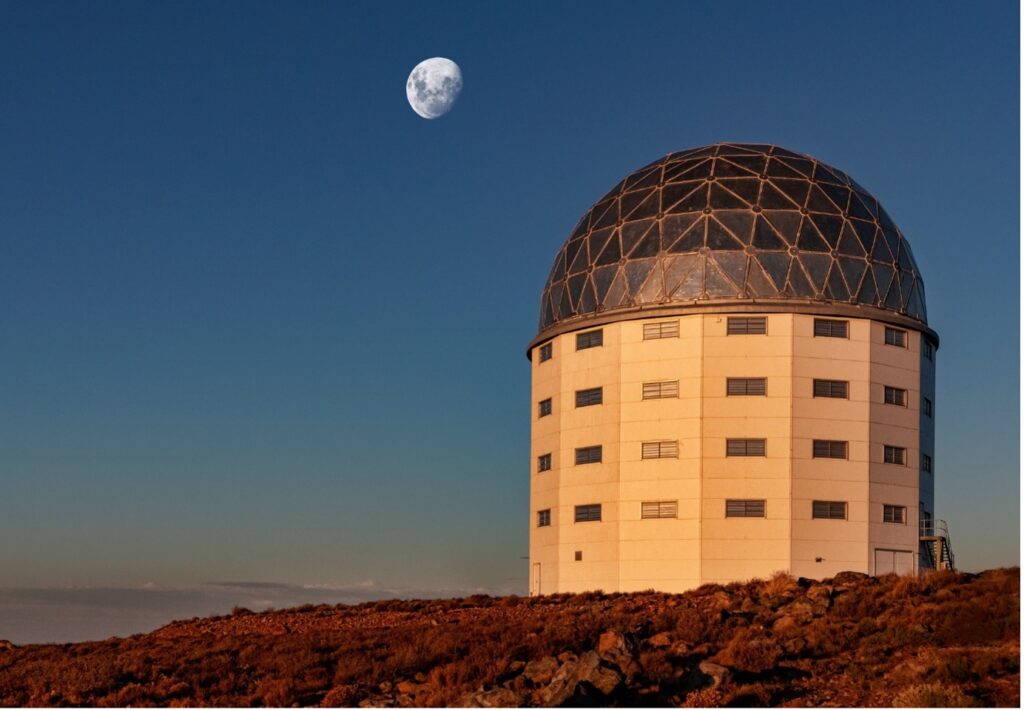
One of the telescopes in South Africa, image included with SALT’s permission. © Southern African Large Telescope.
Words are in the world and of the world (Barad and Gandorfer 2021, 33). Words do things, change things. Words matter. Words create worlds and spaces of possibility.
For many people in Africa, astrophysics is an unlikely scientific discipline to participate in. For many astrophysicists across the globe Africa appears to be (infra-)structurally disadvantaged and not the place to do cutting-edge science. Against the odds, astrophysicists in Africa pursue world-class research, most of which happens in South Africa, where astrophysics is politically supported. Living in the mode of despite, astrophysicists in Africa acknowledge the conditions that render their research unlikely and continue to mark their presence. And they do so vocally.
In this essay, I focus on one particular word and its career in a particular discursive-material setting. The word opened a space that acknowledged a current situation ripe with challenges without allowing these challenges to trump imaginaries of and actions towards a situation that is different. I first encountered the word in an online meeting that was part of my digital ethnographic fieldwork and the first time it was mentioned, it provoked a reaction from the speaker’s audience—surprise, curiosity, perhaps unease. It was clearly an unusual word for this context, but this word had come into the meeting with its own history, and it continues to shape the discourse in a distinct way. The word I want to focus this essay on is “audacious,” employed by astronomers (scientists and amateurs) in Africa. By using “audacious,” astronomers in Africa reconfigure what counts as “normal” and carve out a material-discursive space to live in the mode of despite.
The word: “audacious”
The word “audacious” suggests boldness or cheekiness, even “arrogant disregard of normal restraints” (Merriam-Webster Dictionary). It characterizes a noun and marks a characteristic that is not inherent to the noun itself, but needs pointing out. Uttering (or writing) the word recognizes the cheekiness; it not only describes, but comments on the quality of cheekiness and prescribes this interpretation before the noun enters the stage. The word “audacious” invites others to think along, to buy into the narrative, and to join the performance without dismissing it as too outrageous, too daring, or too illusionary. The word “audacious” creates possibilities to participate despite real constraints, despite a dominant narrative that suggests futility, despite feelings of marginality. Employed by astronomers in Africa, the word “audacious” became a tool to act in the mode of despite.

Audacious. Image by author.
The setting – 1
The International Astronomical Union (IAU) is going to have its triannual General Assembly (GA) in Cape Town in 2024. This marks the first time in its more than 200 years of existence that the IAU-GA is taking place in Africa. When South African astronomers bid to host the event, the application was framed as “African,” marking a unique opportunity to finally bring the IAU to a continent to which it had not yet traveled. The bid was supported by Khotso Mokhele, the former president of the South African National Research Foundation (NRF). Deploying his considerable rhetorical skills, Mokhele used the word “audacious” to encourage the IAU to select South Africa, an “African” country capable of hosting the event despite all the challenges that the continent faces. The bid was successful—the IAU convinced by the self-reflexively “audacious” proposal.
The setting – 2
In 2021, in preparation for the IAU-GA coming to Africa, the local organizing committee set up an online meeting to craft a vision for the future of astronomy in Africa. More than 400 people registered, mostly astronomers from across the continent but also me, an ethnographer who is studying astronomy in Africa. Besides acquainting the participants with the various astronomy initiatives that are taking place on the continent, this meeting aimed to cultivate a bottom-up approach to collectively work on a vision for astronomy in Africa. The organizers shared a link to a carefully structured Google doc titled “Astronomy 2024: The Audacious African Vision.” There it was again—“audacious.” What did “audacious” do to the title? Were visions not always audacious? What’s the value of including this word? I asked myself these questions and continued to watch and listen.
When one of the organizers read out the title, he was met with some interested, perhaps confused, perhaps questioning looks. Some participants chuckled and the organizer, expecting such a reaction, affirmed that this term was chosen deliberately. He referenced Khotso Mokhele (The setting – 1) and explained that this vision document was meant to be a space for the formulation of grand ideas. He said that we, the participants, should not limit ourselves but rather overcome social conventions about what counts as arrogant and inappropriate. Put differently: we were to be self-consciously audacious for the purposes of this exercise. Although he was situated in South Africa, and although the meeting was organized from there, he refused to assume South Africa’s relative privilege. Instead, he chose to organize the meeting and thus create capacities for astronomers in other African countries to be included. And it worked.
When participants took the opportunity to voice their ideas, they often justified the grandness and perhaps unrealistic (but maybe also doable) character of their ideas with the word “audacious.” In a short time, the document was filled with these ideas and more, as well as with plenty of comments and annotations. The participants embraced the chance to free themselves from the usual arguments about feasibility, the financial / economic / political condition in Africa, and more pressing problems that require attention, all of which usually stifle enthusiasm. Instead, they lived up to the task to think audaciously—with and through the word “audacious.”
The setting – 3
A few months later, at the conference of the African Astronomical Society (AfAS), the spirit of the online meeting (The setting – 2) was still present—and once again it found expression through the word “audacious.” Khotso Mokhele (see The setting – 1), in his presentation on the history of astronomy in South Africa, said that “we became equally confident and arrogant; it was okay for us to be bold and audacious for the benefit of human-kind.” After he had spoken, other presenters also included the word in their talks, one of whom said that “we must be audacious in our science.” Many others made last-minute amendments to their presentations to join the choir and report on the audaciousness of their outreach and research activities. “Is this audacious?” another presenter asked on his last slide. Answering this by now rhetorical question, he affirmed that the plans for yet another telescope were indeed audacious, which he took to be a virtue. Yet another presenter reported on a very successful past project and concluded that “what you need to bring to such a project is to be audacious.” If not before, then since the time the AfAS conference took place, the word “audacious” has entered the vocabulary with which to frame activities around astronomy in Africa. Becoming an established part of the vocabulary, the word’s radical underpinnings turned into an acceptable and accepted way of being in the mode of despite.
Both/and
Still, claiming the word “audacious” to describe one’s own vision and proposed activities is empowering because it works in two directions simultaneously. It serves both as a nod to the established discursive framework that posits Africa as disadvantaged, thus making astronomical activities unlikely, even disrespectful, and as an announcement that one intends to follow through with the vision nevertheless.¹
Both: It acknowledges that astronomers might feel uncomfortable to voice grand visions for a scientific future in Africa that might be read as being out of touch with reality. It alludes to astronomers’ imperatives to justify astrophysical research in places that are ripe with other problems to be solved urgently. In my research, I have encountered this discomfort a lot.
And: The word “audacious” encourages acting and thinking big despite everyday challenges. It encourages boldness, even arrogance, in its appeal to envision African astrophysicists who are capable of collaborating and competing on a global level. In my research, I also encountered this resistance to prematurely downplaying one’s potential achievements.
Here, “audacious” is not a description from outside that evaluates and mocks the astronomer’s vision for their discipline in Africa as overly ambitious; rather, it is a powerful self-ascription. Taking ownership of the word “audacious” for their own purposes, Khotso Mokhele, the participants of the online meeting, and the presenters at the conference could simultaneously recognize what they encounter as “normal constraints” while taking steps to go beyond these limitations.
An “audacious” vision suggests that it is daring to advocate for gazing into outer space when the dominant discourse points to conditions on the ground are in dire need of being addressed. Employing the word “audacious,” here, is a decision to nevertheless conceive of a future of astronomy in Africa, irrespective of binding constraints, and to actively take steps towards this future. Implying the odds against which “audacious” action takes shape, the term “audacious” (similar to the term “despite”) allows to think about agency alongside the conditions of acting.
Despite
Living in the mode of despite reconfigures a sense of normality while acknowledging the circumstances that (appear to) prevent such normality. Employing the term “audacious,” astronomers in Africa do this very explicitly. They embrace an “arrogant disregard of normal constraints” (Merriam-Webster Dictionary) and thereby reconfigure what counts as “normal.” Because “words are in the world and of the world” (Barad and Gandorfer 2021, 33), because they comment on the world and have an effect in the world, the word “audacious” creates a space of possibility. Allowing astronomers in Africa both to think big and simultaneously to recognize the conditions in which this thinking takes place, the word “audacious” affects people and effects a vision for a future amidst discursive constraints and material challenges.
Notes
[1] For a discussion on how both/and relates to either/or, see Lambek 2015.
References
Barad, Karen, and Daniela Gandorfer. 2021. “Political Desirings: Yearnings for Mattering (,) Differently.” Theory & Event 24 (1): 14–66.
Lambek, Michael J. 2015. “Both/And.” In What Is Existential Anthropology? edited by Michael Jackson and Albert Piette, 58–83. New York: Berghahn.
Merriam-Webster.com Dictionary. “audacious.” Retrieved from https://www.merriam-webster.com/dictionary/audacious
Hanna Nieber is a research fellow at the Max Planck Institute of Social Anthropology. Her current project focuses on astronomy in Madagascar and in Africa more broadly. She is interested in how astronomy connects a fascination for the dynamics of outer space with geopolitical constellations on earth.
Cite as: Nieber, Hanna. 2024. “An Audacious Vision”. In “Living in a Mode of Despite”, edited by Rishabh Raghavan, Mascha Schulz, and Julia Vorhölter, American Ethnologist website, 3 October 2024. [https://americanethnologist.org/online-content/collections/living-in-a-mode-of-despite/an-audacious-visionby-hanna-nieber/]
This piece was edited by American Ethnological Society Digital Content Editor Katie Kilroy-Marac (katie.kilroy.marac@utoronto.ca).




